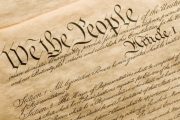On Tuesday, April 16, Governor Sam Brownback of Kansas (shown) signed a bill purporting to safeguard the constitutionally protected right of Kansans to keep and bear arms.
Titled the Second Amendment Protection Act, SB 102 declares:
The second amendment to the constitution of the United States reserves to the people, individually, the right to keep and bear arms as that right was understood at the time that Kansas was admitted to statehood in 1861, and the guaranty of that right is a matter of contract between the state and people of Kansas and the United States as of the time that the compact with the United States was agreed upon and adopted by Kansas in 1859 and the United States in 1861.
Praise for the measure has come from many in the liberty community who view the act as a forceful counterattack to the federal assault on the Second Amendment.
Admittedly, several sections of the act use very strong and unequivocal language to defend the right of citizens of the Sunflower State to own firearms as guaranteed by the Second Amendment. For example, Section 6(a) of the bill declares:
“Any act, law, treaty, order, rule or regulation of the government of the United States which violates the second amendment to the constitution of the United States is null, void and unenforceable in the state of Kansas.”
That is undeniably a very firm and constitutionally sound rejection of recent attempts by the federal government (both those planned and those already perpetrated) to unlawfully infringe on the right of Americans to own weapons. For this, the Kansas legislature and Governor Brownback deserve the praise they have received.
However, the next section of the new law, Section 6(b), seems to sap some of the strength from this otherwise potent statute. As amended by the state House of Representatives, Section 6(b) reads:
No official, agent or employee of the state of Kansas, or any political subdivision thereof, shall enforce or attempt to enforce any act, law, treaty, order, rule or regulation of the government of the United States regarding any personal firearm, firearm accessory or ammunition that is manufactured commercially or privately and owned in the state of Kansas and that remains within the borders of Kansas. [Emphasis added.]
For comparison, consider the original text of the same section of the bill prior to the changes affected by the committee:
No official, agent or employee of the state of Kansas, nor any dealer selling any firearm in the state of Kansas, or any political subdivision thereof, shall enforce or attempt to enforce any act, law, treaty, order, rule or regulation of the government of the United States regarding any personal firearm, firearm accessory or ammunition that is owned or manufactured commercially or privately in the state of Kansas and that remains within the borders of Kansas. [Emphasis added.]
Although the difference seems slight — it is only the shifting of a couple of words a few places to the right — the legal implications are substantial.
As enacted by the governor, Kansas’s Second Amendment Preservation Act would, by using “and” in place of “or,” apply only to that very small range of firearms, firearm accessories, and ammunition that are both manufactured and owned in Kansas. That leaves those citizens who own firearms manufactured in other states (or countries, for that matter) outside the zone of this law’s protections. Furthermore, the original bill stated that firearms dealers operating in Kansas were prohibited from enforcing federal gun control laws, while the amended version essentially restricts the prohibition to state officials and employees.
Another less than exemplary section of the Kansas law — Section 4 — intimates that those guns owned by Kansans that were manufactured outside of the state are subject to federal restrictions under the authority of the interstate commerce clause of Article I, Section 8 of the Constitution.
While Congress may possess a certain level of regulatory power over the interstate trade of weapons, parts, and ammunition, these regulations cannot infringe on the right to keep and bear arms without violating the express prohibitions set out in the Second Amendment. The Second Amendment permits no exceptions to its prohibitions on any federal infringement on the right to keep and bear arms. Section 4 of the Kansas law would seem to permit such an unconstitutional exercise of power.
To its credit, Section 7 of the law declares:
It is unlawful for any official, agent or employee of the government of the United States, or employee of a corporation providing services to the government of the United States to enforce or attempt to enforce any act, law, treaty, order, rule or regulation of the government of the United States regarding a firearm, a firearm accessory, or ammunition that is manufactured commercially or privately and owned in the state of Kansas and that remains within the borders of Kansas. Violation of this section is a severity level 10 nonperson felony.
State laws that impose criminal penalties on attempts to confiscate or otherwise control the unalienable right of Americans to keep and bear arms are preferable to other toothless, non-binding resolutions that are simply symbolic defenses of that right. So, for that, again, Kansas is to be congratulated.
However, that section, too, severely limits the application of the criminal penalties to firearms both manufactured and owned in Kansas, rather than a broader, more encompassing (and constitutionally sound) provision that would cover firearms, accessories, and ammunition manufactured or owned, as was originally written in the bill.
Another deficiency in Section 7 of the law provides that any federal official or agent of the federal official facing trial for violating the state’s Second Amendment Protection Act “shall not be arrested or otherwise detained prior to, or during the pendency of, any trial for a violation of this section.” Again, an unfortunate dilution of an otherwise potent state law.
The watering down of this law is understandable given the fact that nearly 33 percent of the Kansas state budget comes from federal funds. It is difficult for governors and state lawmakers to bite the hand that feeds them, although a little nip now and then is tolerated.
In light of recent movements by the president, Congress, and the United Nations to effectively repeal the Second Amendment, there is an urgent need for states to stand up and assert their constitutional authority to resist any federal act not specifically permitted in the “few and defined” powers delegated to it in the Constitution. States must nullify all such attempts to deny citizens of their God-given rights, including the right to keep and bear arms. Nullification, not capitulation, is the way to defeat the powerful forces combined against the continued enjoyment of freedom.
Regarding the rightful role of nullification and the private ownership of weapons, lawmakers and citizens alike should remember the words of imminent jurist Joseph Story, who wrote in 1833: “The right of the citizens to keep and bear arms has justly been considered, as the palladium of the liberties of a republic; since it offers a strong moral check against the usurpation and arbitrary power of rulers; and will generally, even if these are successful in the first instance, enable the people to resist and triumph over them.”
Photo of Kansas Governor Sam Brownback: AP Images
Joe A. Wolverton, II, J.D. is a correspondent for The New American and travels frequently nationwide speaking on topics of nullification, the NDAA, and the surveillance state. He can be reached at [email protected].




